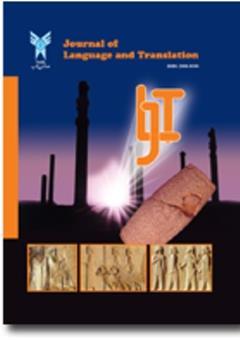Effect of Student-Generated Vocabulary Factors on EFL Learners' Autonomy
محورهای موضوعی : نشریه زبان و ترجمه
Kulsoum Ghasemi
1
![]() ,
Shahram Afraz
2
,
Shahram Afraz
2
![]() ,
Fazlolah Samimi
3
,
Fazlolah Samimi
3
1 - Department of English, Qeshm Branch, Islamic Azad University, Qeshm, Iran
2 - Department of English, Qeshm Branch, Islamic Azad University, Qeshm, Iran
3 - Department of English, Bandar-Abbas Branch, Islamic Azad University, Bandar-Abbas, Iran
کلید واژه: autonomy, student-generated vocabulary, autonomous learner, testing,
چکیده مقاله :
The present study aimed at investigating student-generated vocabulary testing factors fostering autonomy among Iranian EFL learners. The changing needs of today's society have redefined the goals of education in general and teacher and learner roles in particular. Learners are no longer viewed as the individuals who passively receive knowledge from teachers. Instead, the modern society has necessitated a lifelong learning, that is, training learners by giving them the power to take the responsibility of their own learning. The qualitative method of research was used in this study. The participants consisted of 30 EFL learners studying or finished teaching English. A semi-structured interviews were designed and conducted. After conducting all the interviews, the recorded interviews were transcribed by the researcher. In order to maintain the confidentiality, each participant was given a name other than his or her real names. Then, the transcripts and interviews' notes and memos returned to the participants and they were asked to ensure that the data was genuine and truly based on their opinions. Then, the transcripts were read and reread several times in order to thoroughly comprehend and get familiar with. In this qualitative research, MAXQDA software was used to analyze the data. A large number of codes were consequently provided by the software and a list of tentative categories were prepared (4 themes and 14 categories) by the constant comparative method. The four themes are: 1- Personality characteristics 2- Positive points of student-generated vocabulary testing, 3- Negative points of student-generated vocabulary testing, 4- Teacher’s role.
The present study aimed at investigating student-generated vocabulary testing factors fostering autonomy among Iranian EFL learners. The changing needs of today's society have redefined the goals of education in general and teacher and learner roles in particular. Learners are no longer viewed as the individuals who passively receive knowledge from teachers. Instead, the modern society has necessitated a lifelong learning, that is, training learners by giving them the power to take the responsibility of their own learning. The qualitative method of research was used in this study. The participants consisted of 30 EFL learners studying or finished teaching English. A semi-structured interviews were designed and conducted. After conducting all the interviews, the recorded interviews were transcribed by the researcher. In order to maintain the confidentiality, each participant was given a name other than his or her real names. Then, the transcripts and interviews' notes and memos returned to the participants and they were asked to ensure that the data was genuine and truly based on their opinions. Then, the transcripts were read and reread several times in order to thoroughly comprehend and get familiar with. In this qualitative research, MAXQDA software was used to analyze the data. A large number of codes were consequently provided by the software and a list of tentative categories were prepared (4 themes and 14 categories) by the constant comparative method. The four themes are: 1- Personality characteristics 2- Positive points of student-generated vocabulary testing, 3- Negative points of student-generated vocabulary testing, 4- Teacher’s role.
Al-Jabiri, H. (2019). Gender hierarchies in Iraqi media: Reinforcement of patriarchal norms in p discourse. Journal of Middle Eastern Media, 12(2), 215-234.
Al-Mousawi, N. (2017). Authority figures and media representation in Iraq: A gender analysis. Iraqi Journal of Media Studies, 5(1), 144-159.
Baxter, J. (2016). Gender and language in media contexts: Analyzing power dynamics. Journal of Sociolinguistics, 20(3), 401-422.
Evans, V., & Green, M. (2023). Cognitive sociolinguistics: Language, mind, and social meaning. Oxford University Press.
Holmes, J. (2020). Gendered talk at work: Language and power in the professional workplace (2nd ed.). Wiley-Blackwell.
Holmes, J. (2023). The evolving role of gender in conversational control in media discourse. Media and Communication Studies, 29(2), 57-78.
Meyerhoff, M. (2023). Turn-taking and conversational dynamics: Gender differences in media and society. Pragmatics and Society, 12(1), 25-42.
Purba, D., Smith, R., & Benavidez, J. (2023). Collaboration or dominance: Gendered language use in Indonesian media talk shows. Journal of Pragmatics, 45(3), 92-112.
Sacks, H., Schegloff, E. A., & Jefferson, G. (2022). A simplified system for the organization of turn-taking for conversation. Language, 50(4), 696-735.
Tannen, D. (2022). You just don't understand: Women and men in conversation (3rd ed.). HarperCollins.


